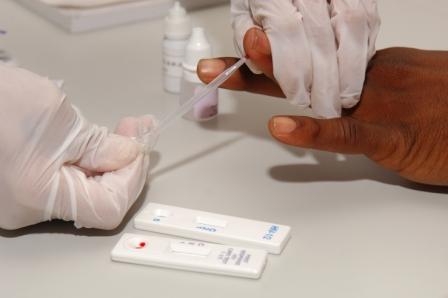Singapore Study Warns That Infected SARS-CoV-2 Patients Can Falsely Test Positive For HIV On Certain Diagnostic Platforms!
Source: COVID-19 News Jun 28, 2021 3 years, 9 months, 4 weeks, 17 hours, 5 minutes ago
COVID-19 News: Already we are seeing more evidence that SARS-CoV-2 infections are far more worse than HIV infections including those by the newer emerging variants, whereby the immune system is damaged and disrupted by these coronaviruses leading to not just immediate health issues but also to more complicated long term medical conditions down the road for so called recovered COVID-19 patients, now to add to more interesting developments, a new study conducted by researchers from National University Hospital, Singapore have discovered that SARS-CoV-2 infected patients are able to test falsely positive for most standard HIV diagnostic platforms.

The study results were published as a correspondence to the peer reviewed British Medical Journal’s sub-publication called the Journal of Clinical Pathology.
https://jcp.bmj.com/content/early/2020/09/08/jclinpath-2020-206942
According to the researchers, during the COVID-19 pandemic, several patients from their institution ie the National University Hospital, have had a simultaneous screening test for serum HIV antigen/antibodies as well as a nasopharyngeal swab for SARS-CoV-2 real-time reverse transcription PCR (rRT-PCR) upon admission or check-ups.While the molecular results often have a delayed turnaround time in light of increased testing volume, HIV screen performed as a chemiluminescent immunoassay on the Abbott Architect platform (Abbott Laboratories, Abbott Park, Illinois, USA) has a testing time of only 30 min.
The study team retrospectively reviewed and identified two positive COVID-19 cases on rRT-PCR who concurrently tested reactive for HIV on the Architect, with further confounding results.
It was reported that both patients were admitted and tested in the same month.
The first patient was a man in his early 20s who had no significant medical history, presenting with a persistent fever for 2 days, dry cough and pharyngitis. He was not on any long-term medications. His initial laboratory investigations revealed white blood cells of 5.85×109/litre (3.84–10.01), haemoglobin 144 g/L (131–166), haematocrit 43.7% (40.3–50.3), platelet 233×109/L (164–387), sodium 137 mmol/L (135–145), potassium 4.1 mmol/L (3.5–5.0), C reactive protein <5 mg/L (0–10), ferritin 126 μg (20–300) and CareUS Dengue Combo kit was negative for NS1, IgM and IgG. His chest X-ray was otherwise normal. His first nasopharyngeal swab tested positive for SARS-CoV-2 and a concurrent HIV serological test on the Abbott Architect platform using the chemiluminescent immunoassay was reactive at 28.76 s/CO (sample relative light unit/cut-off relative light unit). Specimens with S/CO values of ≥1 are considered reactive.
The second patient was a male in his early 70s who had a history of benign prostatic hyperplasia taking alfuzosin. He was a close contact of his wife who was recently diagnosed with COVID-19 and thence presented with high fever, dry cough and pharyngitis to the hospital. Chest X-ray revealed significant lower left zone atelectasis. His initial laboratory investigations revealed a white blood cell count of 13.89×109/L (3.84–10.01), haemoglobin 150 g/L (131–166), haematocrit 43.6% (40.3–50.3), platelets 202&am
p;times;109/L (164–387), C reactive protein of 132 mg/L (0–10), ferritin 142 μg/L (20–300), sodium 136 mmol/L (135–145) and potassium 3.9 mmol/L (3.5–5.0). His first nasopharyngeal swab similarly tested positive for SARS-CoV-2 and a concurrent HIV test on the Abbott Architect platform was reactive at 1.11 s/CO. Neither of the patients reported previous blood transfusions, intravenous drug use or drug therapies, which may interact with testing.
The two patients’ serum samples were repeated on a different Abbott Architect platform in a separate institution, which continued to show reactivity on the HIV chemiluminescent immunoassay.
Their sera were then further followed up by testing on a fourth generation, VIDAS HIV duo assay (BioMérieux, Durham, North Carolina, USA), an enzyme-linked fluorescent assay, which combines the detection of anti-HIV-1 (groups M and O) and anti-HIV-2 total immunoglobulins with HIV-1 p24 antigens.
Both sera were negative for this duo assay. Confirmatory testing was then performed on the MP Biomedicals HIV immunoblot, which was negative in both sera.
The study findings underscores several important learning points:
The study team had shown for the first time that there is cross-reactivity of SARS-CoV-2 antigen/antibodies with commercial chemiluminescent immunoassays leading to a false-positive result.
A past study had shown via sequence analysis had shown that HIV and SARS-CoV viral proteins shared sequence motifs that construct their active confirmation, which may explain a certain degree of homology in their proteins.
https://bmcmicrobiol.biomedcentral.com/articles/10.1186/1471-2180-3-20
Also the limitation of HIV chemiluminescent assays must be emphasised. Another previous study had previously demonstrated the susceptibility of fourth-generation p24 HIV antigen/antibody tests to false positivity from an array of pathogens, including that of Epstein-Barr virus and metastatic cancer.
https://aidsrestherapy.biomedcentral.com/articles/10.1186/s12981-015-0086-3
Furthermore other institutions have also reported interfering substances such as rheumatoid factor, anti-hepatitis C virus, liver cirrhosis and autoimmune disease.
https://journals.asm.org/doi/full/10.1128/JCM.40.6.1938-1946.2002
Although published literature has reported specificity of HIV chemiluminescent immunoassays to be 99% or better, clinicians should be cognizant to the fact that discordant COVID-19 and HIV results necessitate professional laboratory consult in view of potential analytical error, where patient safety may be compromised if treatment is initiated prematurely.
https://www.sciencedirect.com/science/article/abs/pii/S0166093407000900
It should be noted that the limitation of this study is that the patients’ attending physicians had not sent a sample for HIV nucleic acid testing, which would be definitive. To further investigate cross-reactivity, a study for spiked SARS-CoV-2 antigen/antibodies on healthy sera should be performed to verify performance of HIV chemiluminescent immunoassays.
For the latest
COVID-19 News, keep on logging to Thailand Medical News.
